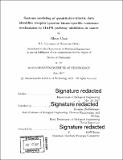Systems modeling of quantitative kinetic data identifies receptor tyrosine kinase-specific resistance mechanisms to MAPK pathway inhibition in cancer
Author(s)
Claas, Allison
DownloadFull printable version (20.37Mb)
Other Contributors
Massachusetts Institute of Technology. Department of Biological Engineering.
Advisor
Douglas A. Lauffenburger.
Terms of use
Metadata
Show full item recordAbstract
Targeted cancer therapeutics have seen constraint in clinical efficacy due to resistance. Indicators for resistance may include genetic mutations or protein-level overexpression of targeted or bypass receptor tyrosine kinases (RTKs). While the latter is often attributed to gene amplification, genetic characterization of tumor biopsies has failed to explain substantial proportions of resistance. We hypothesize that post-synthesis mechanisms governing RTK levels may represent underappreciated contributors to drug resistance. We have developed an experimental and computational model for the simultaneous analysis of synthesis and post-synthesis mechanisms contributing to protein level changes. The experimental component quantitatively measures processes operating on multiple time scales in a multi-plexed fashion, with methods generalizable to any membrane bound protein. Parameter distribution estimation by fitting data to an integrative cellular model quantifies native RTK processes and enables the study of treatment induced mechanistic changes. It has been reported that triple negative breast cancer cell lines up-regulate many RTKs in response to Mek inhibition, although reported with conflicting mechanisms. Upon integrated analysis, we find both Axl and Her2 have increased lysate levels after Mek inhibition with 3 Mek inhibitors, Selumetinib, Binimetinib, and PD0325901. Axl changes are attributed to a decrease in proteolytic shedding and protein degradation, and Her2 changes are attributed to decreased synthesis. Met shows a decrease in proteolytic shedding similar to Axl, but compensating synthesis and degradation mechanisms counteract the effect. Contrastingly, Erk inhibition shows minor effects on RTK reprogramming, with Erk dimer inhibitor DEL-22379 exhibiting RTK specific protease effects and highlighting RTK specific outcomes of decreased endocytosis. This quantitative model enables prediction of combination therapies with mechanistic process inhibitors. Our predictions match experimental observations that Axl lysate level increases with Mek inhibition remains unchanged in the presence of transcriptional inhibition, supporting a role for post-synthesis mechanisms. Through additional combination with an Axl inhibitor, we are able to further the anti-proliferative and anti-migratory effect of Mek and transcriptional inhibition in TNBC. This study not only provides a novel and broadly applicable quantitative framework for characterizing RTK level changes, but also emphasizes the RTK, pathway target, and inhibitor variation of RTK reprogramming in drug resistance.
Description
Thesis: Ph. D., Massachusetts Institute of Technology, Department of Biological Engineering, 2017. Cataloged from PDF version of thesis. Includes bibliographical references (pages 149-156).
Date issued
2017Department
Massachusetts Institute of Technology. Department of Biological EngineeringPublisher
Massachusetts Institute of Technology
Keywords
Biological Engineering.